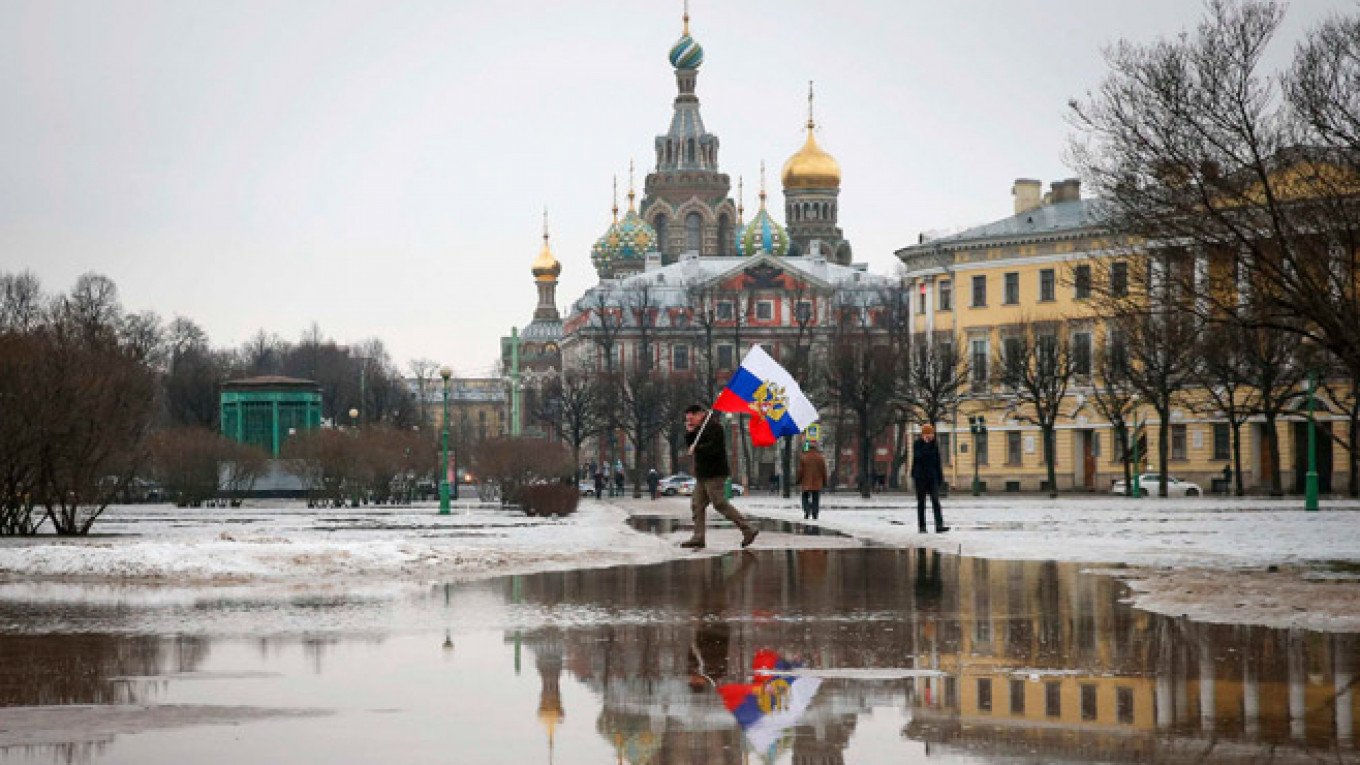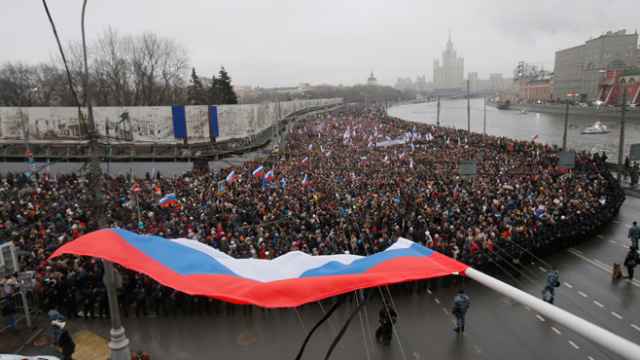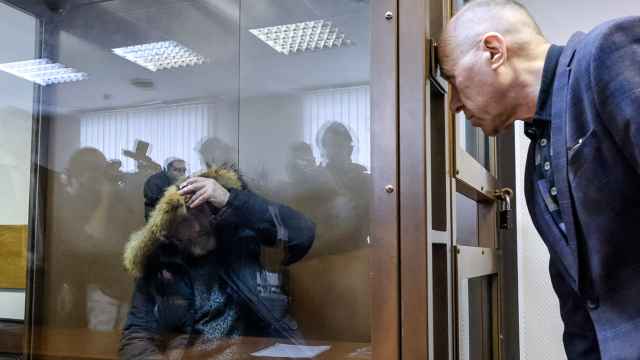President Vladimir Putin urged Interior Ministry officials on Wednesday to focus on smothering budding color revolutions, thus bolstering the current political climate by reinforcing a widespread fear of domestic enemies, analysts told The Moscow Times.
"We see attempts to use so-called 'color revolution technology,' ranging from organizing unlawful public protests to open propaganda of hatred and enmity on social networks," Putin said during Wednesday's expanded session of the Interior Ministry Board, according to the Kremlin's website.
"The aim is obvious — to provoke civil conflict and strike a blow at our country's constitutional foundations, and ultimately even at our sovereignty," he said, adding that "preventive work" should be done to counter the eventuality.
A color revolution in Russia seems highly unlikely given Putin's vertiginous 86 percent approval rating and the population's general reluctance to protest. Yet the notion has permeated Putin's lexicon, emerging periodically in his speeches. At a Security Council meeting in November, Putin said that color revolutions in post-Soviet states should serve as a "lesson and warning," emphasizing that "everything necessary" should be done to prevent their occurrence in Russia.
Both pro-Kremlin and independent analysts told The Moscow Times that the Kremlin does not genuinely believe in the possibility of a color revolution.
Konstantin Kostin, a political analyst and former high-ranking member of the presidential administration (2008-2012), believes that the authorities understand that a popular uprising in "extremely improbable" in Russia, but feel the political necessity of safeguarding themselves from even the most unlikely events.
"Even if a crime is unlikely to be committed, it doesn't mean preventative work shouldn't be done," Kostin, who now heads the Civil Society Development Foundation, told The Moscow Times on Wednesday.
The "prevention" terminology employed by both Putin and Kostin aims to shore up Russia's current political climate, which allows Putin to enjoy a high approval rating while leaving the opposition in a weakened state, according to Alexei Levinson, the director of social research at the Moscow-based Levada Center, an independent pollster.
A survey published last week by the Levada Center revealed that only 10 percent of the population would willingly take part in a political protest. The vast majority — 86 percent of Russians — squarely reject the possibility of participating in such demonstrations, according to the survey, which was conducted in February among 1,600 respondents with a margin of error not exceeding 3.4 percent.
The poll also showed that only 15 percent of the Russian population sympathized with members of the country's non-systemic opposition, such as blogger Alexei Navalny and opposition leader Boris Nemtsov, who was gunned down steps from the Kremlin on Friday night. The non-systemic opposition is comprised of individuals, organizations and parties without formal representation in the State Duma.
"There need to be internal enemies for the [authorities] to justify taking the measures needed to keep [the political climate] in its current state," Levinson said. "I think there will be continued attention by officials and state media toward [opposition] groups within the state."
Some Muscovites who took part in Sunday's silent march in Nemtsov's honor were carrying white cardboard signs that said "Propaganda kills" in bold lettering, suggesting his death could have been the result of the vitriolic portrayal of opposition activists as members of the "fifth column" by pro-Kremlin propagandists.
A week prior to Nemtsov's assassination, thousands of people gathered in downtown Moscow for an "Anti-Maidan" rally, whose stated purpose was to prevent color revolutions from happening in Russia. Some of the protestors' signs presented Nemtsov as an "organizer" of the popular unrest in Ukraine that brought about the ouster of President Viktor Yanukovych in February of last year.
Putin also reiterated his theory about Nemtsov's murder during Wednesday's speech, saying that Russia must be saved from the "shame and tragedy" related to such high-profile "politically motivated" assassinations.
"By reminding the Interior Ministry that the country faces internal threats, Putin is striving to ensure that power remains all the more centralized," said Igor Bunin, the director of the Center for Political Technologies think tank.
Putin's message seems to have resonated with government entities close to the Kremlin.
A research body associated with Russia's Security Council is set to recommend the adoption of measures to counter the "destabilization of the internal political situation," the Kommersant newspaper reported Wednesday.
One of the researchers' recommendations, according to Kommersant, will be to battle the "romanticization of revolution" in the country.
Contact the author at [email protected]
A Message from The Moscow Times:
Dear readers,
We are facing unprecedented challenges. Russia's Prosecutor General's Office has designated The Moscow Times as an "undesirable" organization, criminalizing our work and putting our staff at risk of prosecution. This follows our earlier unjust labeling as a "foreign agent."
These actions are direct attempts to silence independent journalism in Russia. The authorities claim our work "discredits the decisions of the Russian leadership." We see things differently: we strive to provide accurate, unbiased reporting on Russia.
We, the journalists of The Moscow Times, refuse to be silenced. But to continue our work, we need your help.
Your support, no matter how small, makes a world of difference. If you can, please support us monthly starting from just $2. It's quick to set up, and every contribution makes a significant impact.
By supporting The Moscow Times, you're defending open, independent journalism in the face of repression. Thank you for standing with us.
Remind me later.






